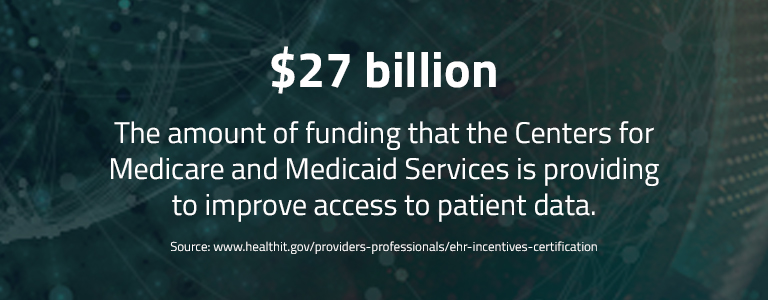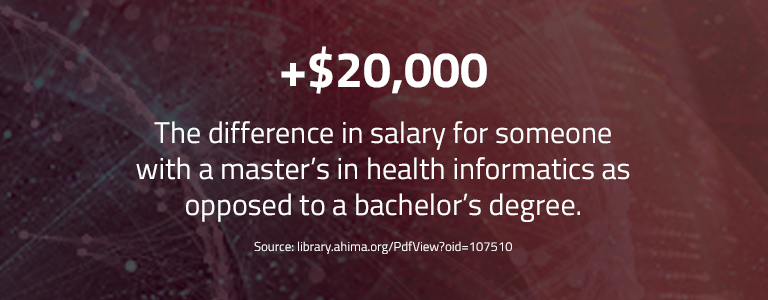What Does the Future Hold for Health Informatics?

Data is the lifeblood of health care. That data takes many forms: It includes the number of immunizations performed in each state; how many patients in a large medical practice have elevated blood glucose readings; and how many hospital inpatients have been billed under each International Classification of Disease (ICD) code. Without this kind of data, the health care industry could not function. But this large amount of data would be impossible to manage without technology and the professionals who understand how to translate it into actionable strategies to improve health outcomes.
Most administrators and clinicians lack the expertise to effectively collect, store and interpret this data, which explains why career opportunities for health informatics professionals have never been more promising.
Why Is Health Informatics Expanding So Rapidly?
To understand why we need health informatics professionals — particularly individuals capable of managing teams of those professionals — we also need to understand what this field actually encompasses.
According to the National Library of Medicine, health care informatics is the interdisciplinary study of the design, development, adoption and application of IT-based innovations in health care services, delivery, management and planning.1 That definition covers a wide range of professional responsibilities and employment paths. Roles in the health informatics field include:
- Chief information officer (CIO)
- Chief medical informatics officer (CMIO)
- Chief security information officer (CSIO)
- Nursing informatics specialist
- Network administrator
- Software engineer
- Computer scientist
- Systems analyst
- IT consultant
- Technical support professional
These and many other positions are needed to help develop new mobile medical apps, protect electronic records systems from data breaches, analyze patient satisfaction surveys to improve quality of care, manage hardware and software updates in medical practices, and create statewide databases to conduct disease surveillance. They will play a crucial role in improving health care delivery by utilizing information to make sound decisions.
The Link Between Legislature and Demand for Health Care Informatics
Health informatics has captured the attention of clinical, administrative and public health leaders around the nation as they realize its potential to solve problems that have vexed these fields for decades. But these are not the only interested groups: The broader field of health IT has also generated the attention of national policymakers and decision-makers across the political spectrum. That rare convergence of interests has resulted in several well-funded federal initiatives that have turned information technology — and health informatics in particular — into one of the major pillars of the nation’s identity.
A closer look at legislation illustrates the emerging role of IT in health care. The American Reinvestment and Recovery Act (ARRA) of 2009 laid the groundwork for a program designed to equip hospitals and medical practices around the country with electronic health record systems. Called the Meaningful Use program, it has provided financial incentives to health care organizations to install these computerized systems. More specifically, the Centers for Medicare and Medicaid Services is making $27 billion available to medical practices and hospitals with the hope that all eligible practitioners will take advantage of the funding to improve access to patient data. This has resulted in an explosion of electronic health records (EHR) companies to meet the need and has generated countless jobs for software engineers, analysts and related IT positions.2

Even before ARRA came into existence, the federal government realized the value of computer technology, as evidenced by the creation of a division within the Department of Health and Human Services to help develop a national health IT infrastructure. In 2004, the first national health information coordinator was appointed to oversee this new national initiative (the role, previously held by Dr. Karen DeSalvo, is now occupied by Dr. B Vindell Washington). In 2010, the Affordable Care Act was also enacted, which further enhanced the role of informatics in the practice of medicine.
All of this legislation created a new surge of activity in health informatics. By 2010, the U.S. Bureau of Labor Statistics had estimated that there would be a shortage of more than 50,000 IT workers over the next five years.3 The demand for IT professionals — and for health care professionals in general — has not slowed down yet. A recent report on the top paying health care careers concluded that “health care is one of the fastest growing careers in the United States. According to the Bureau of Labor Statistics (BLS), jobs in health care are expected to grow at an astonishing rate of 23 percent job growth over the next decade, with an estimated 974,000 new jobs expected.”4 And the Bureau of Labor Statistics says that the median pay for a computer and information systems manager in 2015 was $131,600.5 A separate survey published by the Healthcare Information and Management Services Society (HIMSS) suggests that the average salary in health IT is $111,387, with a median of $90,000. 6
Meeting the Challenge Requires Training and Passion
With these opportunities in mind, college students and health professionals working in other specialties are no doubt wondering what kind of education, skill sets and experience will be needed to take advantage of the shifting health care scene.
Hands-on experience in generic information technology can give job candidates an advantage when looking for a position in health informatics, but many health care decision-makers are interested in recruiting people who understand the unique problems in medicine and nursing. Many also prefer someone with a clinical background who already knows the language of medicine.
Educational training is also important, with master’s-prepared job seekers having an advantage over those with a bachelor’s. A study from the American Health Information Management Association (AHIMA), for example, found that a master’s degree in health care informatics will generate $20,000 more a year in salary than a Bachelor of Science. Equally important in the job search are cognitive and social skills. An analytic mindset and a familiarity with statistics and medical research methodology have merit. Similarly, leadership skills coupled with a willingness to passionately pursue technological solutions to clinical problems will also get recruiters’ attention.

There are, no doubt, many challenges ahead in health care. The population is getting older, the cost of medical care is outpacing the incomes of many Americans, the science that underpins patient care is increasingly complex, and the accumulation of biomedical information is growing exponentially. But for those willing to face these challenges, opportunities abound. To help meet the immense need for professionals who possess this critical array of skills, the Milken Institute School of Public Health at the George Washington University has developed HealthInformatics@GW, the online Master of Science in Management of Health Informatics and Analytics program. HealthInformatics@GW enables students to gain knowledge in both health care IT and health care management so that they can lead innovative teams capable of improving the future of public health and health care.
References
1. The Healthcare Information and Management Systems Society (HIMSS). Health informatics defined. Jan. 7, 2014.
2. The Office of the National Coordinator for Health Information Technology. EHR Incentives & Certification. Apr. 4, 2014.
3. McGee M. The Workforce Challenge. 12/9/2010.
4. Kemppainen, S. 50 top paying healthcare careers. Best Medical Degrees. March 14, 2016.
5. S. Department of Labor Bureau of Labor Statistics. Computer and information systems managers.
6. HIMSS 2015 Compensation Survey.
Citation for this content: HealthInformatics@GW is the online Master of Science (M.S.) in Management of Health Informatics and Analytics program from the Milken Institute School of Public Health at the George Washington University


